-
 Bitcoin
Bitcoin $112400
-1.07% -
 Ethereum
Ethereum $3409
-3.27% -
 XRP
XRP $2.784
-6.60% -
 Tether USDt
Tether USDt $0.9997
-0.03% -
 BNB
BNB $739.3
-2.09% -
 Solana
Solana $158.0
-2.90% -
 USDC
USDC $0.9998
-0.02% -
 TRON
TRON $0.3213
-0.94% -
 Dogecoin
Dogecoin $0.1929
-5.01% -
 Cardano
Cardano $0.6974
-2.82% -
 Hyperliquid
Hyperliquid $36.69
-2.31% -
 Sui
Sui $3.327
-4.80% -
 Stellar
Stellar $0.3672
-5.18% -
 Chainlink
Chainlink $15.65
-3.07% -
 Bitcoin Cash
Bitcoin Cash $525.0
-1.68% -
 Hedera
Hedera $0.2291
-6.00% -
 Avalanche
Avalanche $20.91
-2.96% -
 Ethena USDe
Ethena USDe $1.000
0.00% -
 Toncoin
Toncoin $3.520
-1.12% -
 UNUS SED LEO
UNUS SED LEO $8.968
0.14% -
 Litecoin
Litecoin $105.7
0.26% -
 Shiba Inu
Shiba Inu $0.00001181
-1.79% -
 Polkadot
Polkadot $3.492
-2.08% -
 Uniswap
Uniswap $8.800
-3.10% -
 Dai
Dai $0.9999
-0.01% -
 Monero
Monero $289.9
-3.17% -
 Bitget Token
Bitget Token $4.243
-1.27% -
 Pepe
Pepe $0.00001006
-3.67% -
 Cronos
Cronos $0.1248
-5.68% -
 Aave
Aave $249.7
-2.50%
Is Gemini a safe and secure cryptocurrency exchange?
Gemini, a NY-regulated trust, ensures security via cold storage, 2FA, insurance, and regular audits, offering users robust protection and transparency.
Aug 02, 2025 at 10:42 pm
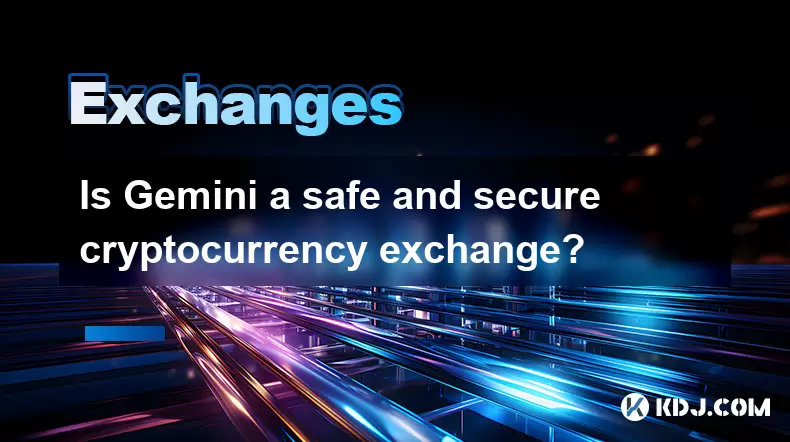
Understanding Gemini’s Regulatory Compliance
Gemini is a New York State-chartered trust company, which places it under the supervision of the New York State Department of Financial Services (NYDFS). This regulatory status requires Gemini to adhere to strict financial and cybersecurity standards, including regular audits, capital reserve requirements, and anti-money laundering (AML) protocols. Being a regulated entity in one of the most stringent financial jurisdictions in the United States significantly enhances its credibility. The exchange must comply with Know Your Customer (KYC) procedures, ensuring that all users verify their identity before trading. This oversight provides a layer of institutional accountability that many decentralized or offshore exchanges do not offer.
Security Infrastructure and Cryptographic Protection
Gemini employs a multi-layered security architecture designed to protect user funds and data. The platform uses cold storage for the vast majority of customer assets, with over 95% of digital assets stored offline. These offline wallets are protected by multi-signature technology, requiring multiple cryptographic keys to authorize transactions. The remaining online assets are safeguarded by hot wallet insurance and real-time monitoring systems. All data transmissions are encrypted using TLS 1.2 or higher, ensuring that login credentials and transaction details are shielded from interception. Furthermore, Gemini implements hardware security modules (HSMs) to generate and store private keys in a tamper-resistant environment, reducing the risk of key exposure.
User Authentication and Account Protection
To prevent unauthorized access, Gemini enforces two-factor authentication (2FA) across all user accounts. Users can enable 2FA via Google Authenticator or hardware security keys such as YubiKey. The platform supports FIDO2/WebAuthn standards, allowing passwordless login through biometric or physical devices. Login attempts are monitored for suspicious activity, including unrecognized devices or locations, which trigger additional verification steps. Users can also set up withdrawal whitelists, restricting fund transfers to pre-approved cryptocurrency addresses. This feature minimizes the impact of account compromise, as attackers cannot redirect funds to arbitrary wallets even if they gain partial access.
Insurance Coverage and Fund Safeguarding
Gemini provides comprehensive insurance coverage for digital assets held on the platform. The exchange maintains a crime insurance policy underwritten by Lloyd’s of London, covering losses from theft, hacking, and employee malfeasance. This policy extends to both online and offline stored assets, a rarity in the cryptocurrency industry where many exchanges only insure hot wallets. The insured amount is substantial, reportedly reaching hundreds of millions of dollars, though the exact figure is not publicly disclosed. In addition to third-party insurance, Gemini holds U.S. dollar deposits in FDIC-insured accounts, although this protection does not extend to cryptocurrency holdings, which are not covered by FDIC insurance.
Transparency and Third-Party Audits
Gemini publishes monthly proof-of-reserves reports audited by independent accounting firms. These reports verify that the exchange holds sufficient assets to cover all customer balances, ensuring that funds are not being leveraged or misappropriated. The data is cryptographically signed and made publicly available, allowing users to independently confirm the integrity of the reserves. The exchange also participates in smart contract audits for its Gemini Dollar (GUSD), a regulated stablecoin pegged 1:1 to the U.S. dollar. These audits are conducted by firms like CertiK and Hacken, identifying vulnerabilities in the codebase before deployment. Regular public disclosures reinforce trust and demonstrate a commitment to operational transparency.
Operational Procedures for Secure Transactions
Conducting secure transactions on Gemini involves several best practices that users should follow.
- Enable two-factor authentication (2FA) during account setup using an authenticator app or hardware key.
- Activate withdrawal address whitelisting in the security settings to restrict fund transfers.
- Use strong, unique passwords and avoid reusing credentials from other platforms.
- Regularly review login activity and device history to detect unauthorized access.
- Store API keys securely if used for trading bots, applying IP whitelisting and restricted permissions.
- Avoid clicking on suspicious links or phishing emails claiming to be from Gemini; always access the platform through the official website.
- Monitor email and SMS notifications for login attempts and withdrawals to stay informed of account activity.
Frequently Asked Questions
Is my personal information safe on Gemini?
Gemini encrypts all personal data using AES-256 encryption and stores it in secure data centers with restricted access. The exchange does not share user information with third parties unless required by law. KYC documents are retained only for compliance purposes and are not used for marketing or external data sales.
Can Gemini freeze my account or funds?
Yes, Gemini may temporarily restrict accounts in response to suspicious activity, regulatory requirements, or legal requests. These actions are typically part of fraud prevention protocols. Users receive notifications when restrictions are applied and can contact support to resolve verification or compliance issues.
How does Gemini handle security breaches?
In the event of a suspected breach, Gemini’s security team initiates an immediate investigation, disables affected systems, and notifies impacted users. The exchange has a dedicated incident response protocol that includes forensic analysis, coordination with law enforcement, and public disclosure if necessary. No major breaches resulting in user fund loss have been reported to date.
Does Gemini support decentralized wallets or self-custody?
While Gemini operates as a centralized exchange, it allows users to transfer funds to external wallets at any time. The platform encourages self-custody by providing clear withdrawal instructions and supporting a wide range of cryptocurrencies. However, once assets are moved off the exchange, they are no longer protected by Gemini’s insurance or security systems.
Disclaimer:info@kdj.com
The information provided is not trading advice. kdj.com does not assume any responsibility for any investments made based on the information provided in this article. Cryptocurrencies are highly volatile and it is highly recommended that you invest with caution after thorough research!
If you believe that the content used on this website infringes your copyright, please contact us immediately (info@kdj.com) and we will delete it promptly.
- Ruvi AI: The AI Token on Cardano Set to Dominate After CMC Listing
- 2025-08-03 04:50:12
- Bitcoin, MicroStrategy, and Institutional Confidence: A Bullish Trifecta?
- 2025-08-03 04:30:12
- Ruvi AI Token: Price Hike Imminent After Presale Milestone?
- 2025-08-03 04:30:12
- Ruvi AI: The Millionaire Maker with a Price Spike on the Horizon?
- 2025-08-03 02:50:12
- DOGE, Utility Coins, and Smart Money: A New Era for Crypto Investing?
- 2025-08-03 02:50:12
- Punisher Coin: Is This Meme Coin the Crypto Investment with 100x ROI Potential?
- 2025-08-03 03:30:12
Related knowledge
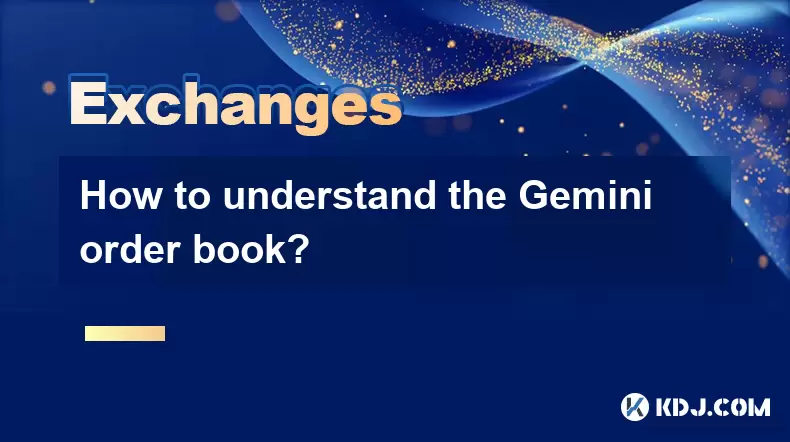
How to understand the Gemini order book?
Aug 02,2025 at 03:35pm
What Is the Gemini Order Book?The Gemini order book is a real-time ledger that displays all open buy and sell orders for a specific cryptocurrency tra...

Is Gemini a safe and secure cryptocurrency exchange?
Aug 02,2025 at 10:42pm
Understanding Gemini’s Regulatory ComplianceGemini is a New York State-chartered trust company, which places it under the supervision of the New York ...
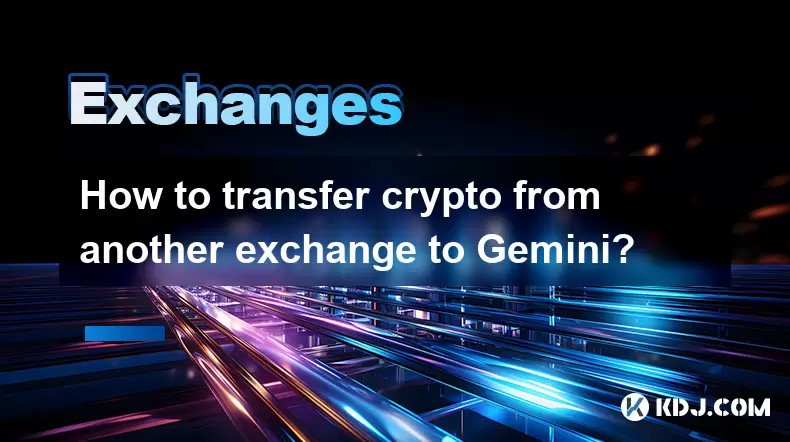
How to transfer crypto from another exchange to Gemini?
Aug 02,2025 at 07:28pm
Understanding the Basics of Crypto Transfers to GeminiTransferring cryptocurrency from another exchange to Gemini involves moving digital assets from ...
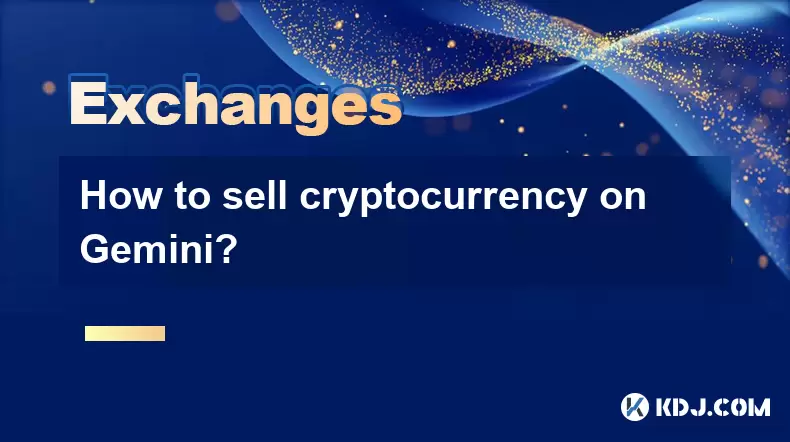
How to sell cryptocurrency on Gemini?
Aug 02,2025 at 05:07pm
Understanding the Gemini Platform and Account SetupBefore selling cryptocurrency on Gemini, it’s essential to ensure you have a fully verified account...

How to fix a failed cryptocurrency deposit to Kraken
Aug 02,2025 at 03:22pm
Understanding Why a Cryptocurrency Deposit Fails on KrakenWhen a cryptocurrency deposit fails on Kraken, the issue typically stems from one of several...
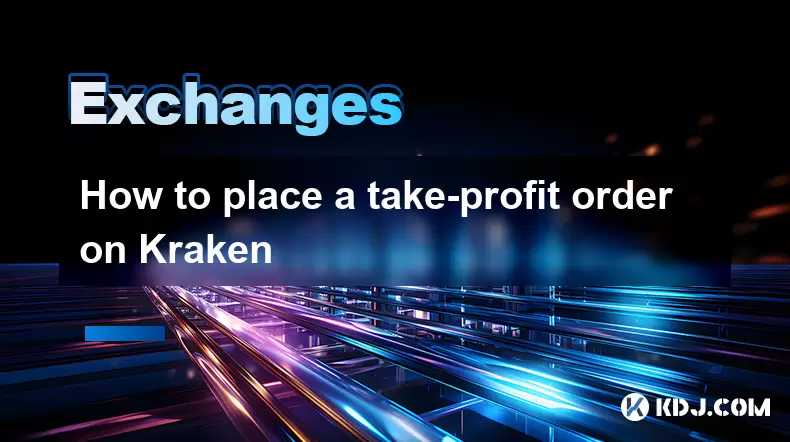
How to place a take-profit order on Kraken
Aug 02,2025 at 02:28pm
Understanding the Role of Private Keys in Cryptocurrency SecurityIn the world of cryptocurrency, private keys are the most critical component of digit...

How to understand the Gemini order book?
Aug 02,2025 at 03:35pm
What Is the Gemini Order Book?The Gemini order book is a real-time ledger that displays all open buy and sell orders for a specific cryptocurrency tra...

Is Gemini a safe and secure cryptocurrency exchange?
Aug 02,2025 at 10:42pm
Understanding Gemini’s Regulatory ComplianceGemini is a New York State-chartered trust company, which places it under the supervision of the New York ...

How to transfer crypto from another exchange to Gemini?
Aug 02,2025 at 07:28pm
Understanding the Basics of Crypto Transfers to GeminiTransferring cryptocurrency from another exchange to Gemini involves moving digital assets from ...

How to sell cryptocurrency on Gemini?
Aug 02,2025 at 05:07pm
Understanding the Gemini Platform and Account SetupBefore selling cryptocurrency on Gemini, it’s essential to ensure you have a fully verified account...

How to fix a failed cryptocurrency deposit to Kraken
Aug 02,2025 at 03:22pm
Understanding Why a Cryptocurrency Deposit Fails on KrakenWhen a cryptocurrency deposit fails on Kraken, the issue typically stems from one of several...

How to place a take-profit order on Kraken
Aug 02,2025 at 02:28pm
Understanding the Role of Private Keys in Cryptocurrency SecurityIn the world of cryptocurrency, private keys are the most critical component of digit...
See all articles

























































































